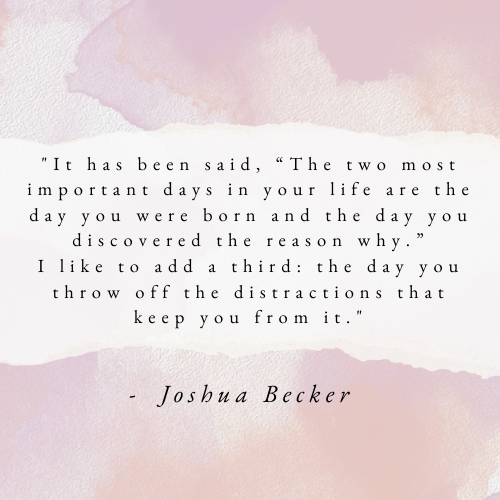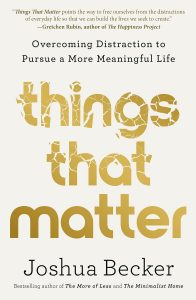Words of Wisdom from Things That Matter: Overcoming Distraction to Pursue a More Meaningful Life by Joshua Becker

Have you ever wondered what else you could do with your time if you didn’t have to spend so much of it “managing possessions” i.e. cleaning and fixing things, tidying and putting things away, or decluttering your home and garage?
In Things That Matter, Joshua Becker draws attention to the time we waste doing things that don’t really matter e.g. managing out possessions and comparing ourselves to others. Becker makes a strong case for a freer way of life, focused on contributing to the world and helping others.
I devoured this book in a couple of days, and as you can see below, there were plenty of things that resonated for me! I hope you enjoy this book as much as I did…
1. Focus on the things that matter
“Close your eyes and answer this question: if you were to die today, what is the one project you would be most disappointed that you weren’t able to complete?” – Charlie Gilkey
2. Read widely, and varied
“In college, I had a professor who taught, “Make a point to read books from previous centuries, because all living writers are swimming in the same cultural and ideological currents. But a book from centuries ago will come from a different perspective and will challenge your thinking in new ways.””
3. Life is long if you know how to use it
“It is not that we have a short time to live, but that we waste a lot of it. Life is long enough, and a sufficiently generous amount has been given to us for the highest achievements if it were all well invested. But when it is wasted in headless luxury and spent on no good activity, we are forced at last by death’s final constraint to realise it has passed away before we knew it was passing. So it is: we are not given a short life but we make it short, and we are not ill-supplied but wasteful of it… Life is long if you know how to use it.”
4. Minimalism creates freedom
“I define minimalism is “the intentional promotion of the things we most value by removing anything that distracts us from them. It isn’t negative; it’s positive. It isn’t primarily about decluttering or organising; it’s about creating freedom. Because we own fewer possessions, we liberate precious energy, time, and focus that we can direct toward more meaningful pursuits.”
5. Set a daily intention
“Set a daily intention: Today, I commit myself to…”
6. Beware of what distracts you!
“What distracts us will begin to define us.” – Bob Goff
7. Don’t let distraction become your lifestyle
“When a distraction becomes a lifestyle, we lose control over the lives we are living. We lose intentionality.”
8. The important stuff is the hardest
“Your most important work will never be the easiest – in fact, it will probably be one of the hardest things you ever do.”
9. The most important days of your life
“It has been said, “The two most important days in your life of the day you were born and the day you discovered the reason why.” I like to add a third: the day you throw of the distractions that keep you from it.”
10. Don’t be disappointed by the things you didn’t do
“Twenty years from now you will be more disappointed by the things you didn’t do than by the ones you did.” – Sarah Francis Brown
11. Learn the difference between “good” and “bad” fear
“On one hand, there is such a thing as good fear. A healthy dose of caution can keep you from doing things you would later regret. But on the other hand, there is also bad fear. A sign of maturity is learning to distinguish between the two.”
12. The main fears that stop people from doing things
“Linkagoal’s Fear Factor Index indicated that the top three fears that prevent people from trying to achieve a goal a second time include fear of failure (43%), fear of being too old (37%), and a fear of lack of support from family and friends (37%).”
13. Don’t let fear stop you from realising your purpose
“You have a purpose and a good that you are designed to bring into this world. Allowing fear to keep you from it would be an unspeakable shame.”
14. Most things we worry about never come true
“Let me inform you that about 85-90 percent of the things people worry about never happen. And that’s not opinion – that’s fact! And even when worries do come true, the outcome is often better than we expected. In other words, the potential reward is usually worth the risk – especially when it comes to accomplishing things that matter.”
15. We want to matter
“Ernest Becker contended that humanity’s greatest fear is actually to die without one’s life having mattered. He said, “What man really fears is not so much extinction, but extinction with insignificance. Man wants to know that his life has somehow counted, if not for himself, then at least in a larger scheme of things, that it has left a trace, a trace that has meaning.”
16. Everyone can do something meaningful in the world
“No one is so guilty or so damaged that they can’t make something different of their future and do something that is meaningful in the world.”
17. How you will fee at the end of your life?
“At the end of your life, would you be prouder of having spent years working and saving to buy a second home and doing what you can to help the poor or suffering in your community? Would you find more pride in having spent most of your spare time with sport shows and video games or in doing the creative work that you are uniquely suited for?”
18. Serve
“Begin to serve a little. And then deserve some more. And then to make service a habit it in your life. You’ll find that you have fewer regrets about how you’re living your life. And one day you’ll realise that the bird of happiness is perched on your shoulder.”
19. Which bracket do you fit into?
9.2% of the worlds population lived on less than $1.90 a day
24.1% of the world lived on less than $3.20 a day
43.6% lived on less than $5.50 a day
To carry this even further and put your financial circumstance into perspective, if your family of four makes $50,000 a year, you’re in the top 10.6 percent of people on the planet for income.
20. Be generous with your money
“In the end, you’ll be prouder of the money you gave to others than the money you kept for yourself.”
21. Challenge yourself to give away money each week
“Try this as an experiment: giveaway five dollars this week. You can drop it in an offering plate, put it in a red kettle outside Walmart, or donate via any number of charities’ websites. At the end of the week, see if you still have food, a roof, and clothing. You will. Your needs will still be met. Test it out again next week. After a few weeks of your needs being met, try giving $10 a week. Again, you will discover that there is food on your table and a roof over your head. The goal here is not to give away just a few dollars a week: the goal is to notice how your needs are being met and how you had extra to spare.”
22. Our material possessions are preventing ups from achieving our goals
“Even worse, we live in a society that champions the pursuit and accumulation of material possessions – “the more, the better” is the mantra we are raised to believe. One of our greatest distractions from pursuing our goals is our hoard of material goods….Who can go gung ho after a challenging goal if they’re constantly buying and taking care of a bunch of stuff? Who can invest in things that matter when they’re too busy organising the garage? We’re drowning and possessions, and all too often our dreams are drowning with us.”
23. Challenge your perspective of material possessions
“After all that time, I’ve come to believe that the number one benefit of minimalism is this: it frees up your money, time, and energy to pursue your greatest passions. In fact, I would say that changing your attitude towards material ownership and getting control of your positions is a necessary step to fulfilling your potential. And it’s doable for everyone.”
24. What are your possessions costing you?
“If you’re not minimising your possessions, you’re minimising your money, time, and potential.”
25. How would you prefer to spend your time?
“According to the American Time Use Survey, the average American spent almost two hours a day taking care of his or her house, including maintenance, repair, decoration, gardening, laundry, internal cleaning, and kitchen duties. Men spend one hour and twenty-five minutes a day on household activities, while women spent two hours and fifteen minutes on such activities.”
26. How to find contentment
“The quickest way to find contentment is to start living with less.”
27. Owning less is not about owning nothing
“Unless your major life purposes require you to travel the world, living off the land, then you’re going to need some positions, such as some furniture, some kitchen utensils, some clothing. To maintain a connection with the past, we need to some mementos and photos. And as we are creatures who are inspired and enabled by beauty, we need some art and other lovely things about us. These are necessities of life, and if you’re going to fulfil your purposes, your needs have to be met. So it’s important to note that owning less is not about owning nothing. It’s about owning the right things – and the right number of them.”
28. What’s the answer?
“I think everybody should get rich and famous and do everything they ever dreamed of so they can see it’s not the answer.” – Jim Carrey
29. What’s your ideal life?
“Instead of wondering where your next vacation is, maybe you should set up a life you don’t need to escape from.” – Seth Godin, Tribes
30. What’s your weekly rhythm?
“My week has a healthy rhythm to it because I’ve taken the advice of a former mentor who said, “You should take two days off each week – one to take care of house duties and one when you rest as much as possible.””
31. The right way to retire
“Research shows that retirement from typical employment, when undertaken in the right way, can improve both health and life satisfaction. Yet 28 percent of recent retirees find that life is worse than when they were working. They feel a sense of isolation and a loss of direction. So how did the other 72 percent find happiness in retirement? Stephen Wright, a financial advisor, put it well: “The key to a happy retirement is to have something that you are retiring to, and not just something that you are retiring from. The difference between happy and unhappy retirees is having a purpose.””
32. work is never perfect
“I know that work is messy and never perfect. And even if the good you are designed to bring into the world is the job that you are paid to do, there are still hard days, hard relationships, and hard things that you have to accomplish that you might not always be happy to do. But if you’re working on things that matter, you’ll never regret it.”
33. Life realisations
“Right before you die, you’ll realise your whole life was about loving people. And you watched too much television.” – Donald Miller
34. Live your own life
“You don’t have to live like everyone else. In fact, you’ll probably be happier if you don’t.”

